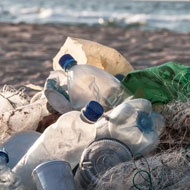Companies pledge to reduce plastic packaging

The companies have pledged to eliminate single-use packaging over the next seven year.
More than 40 UK companies, including Aldi, Pepsico and Unilever, have agreed to reduce their use of plastics by 2025.
The companies are all signatories of the UK Plastics Pact, which was launched on Thursday (26 April) by WRAP, the sustainability campaign group. Amongst the commitments includes a pledge to make 100 per cent of plastic packaging reusable, recyclable or compostable.
The companies have also pledged to eliminate single-use packaging over the next seven years and to ensure that 70 per cent of all plastic packaging is effectively recycled or composted.
WRAP’s CEO Marcus Gover said: “Together, we have a once-in-a-lifetime opportunity to rethink and reshape the future of plastic so that we retain its value, and curtail the damage plastic waste wreaks on our planet.
“This requires a wholescale transformation of the plastics system and can only be achieved by bringing together all links in the chain under a shared commitment to act. That is what makes the UK Plastics Pact unique. It unites every body, business and organisation with a will to act on plastic pollution. We will never have a better time to act, and together we can.”
Environment Secretary, Michael Gove, added: “Our ambition to eliminate avoidable plastic waste will only be realised if government, businesses and the public work together. Industry action can prevent excess plastic reaching our supermarket shelves in the first place.
“I am delighted to see so many businesses sign up to this pact and I hope others will soon follow suit.”
The Pact will stimulate innovative new business models to reduce the total amount of plastic packaging. It will also help build a stronger recycling system, where individuals take more responsibility for their own waste and ensure plastic packaging can be effectively recycled.
WRAP states that the immediate focus will be on identifying the priority projects that will deliver greatest impacts in the short and long term. This includes overcoming barriers to increasing the amount of recycled content used in new packaging.



 The Veterinary Medicines Directorate (VMD) is inviting applications from veterinary students to attend a one-week extramural studies (EMS) placement in July 2026.
The Veterinary Medicines Directorate (VMD) is inviting applications from veterinary students to attend a one-week extramural studies (EMS) placement in July 2026.